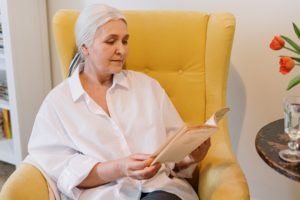Experts Learn From Seniors During the Pandemic

Older adults were hardest hit by the effects of the coronavirus that causes COVID-19, facing the highest risk of serious illness and death from the disease.
Social distancing helped protect them, but posed a threat to their physical and mental health. Geriatric experts around the world continue to study the status of the older population during this unique time, and the lessons learned may help improve care and services for older adults going forward.
In late 2020, the nonpartisan research institution NORC at the University of Chicago reported that older adults were experiencing social isolation during the quarantine, deconditioning from lack of exercise, deferral of medical care, and trouble managing chronic health conditions. Many had difficulty obtaining the food and other supplies they needed.
In May 2021, AARP also reported on the impact of the pandemic. “More than a year into the coronavirus pandemic, most adults 50 and older report that it has had a negative impact on their mental health,” said the researchers. A survey they conducted found that 70% of older adults reported an increase in sadness or depression due to the coronavirus pandemic, and nearly 80% said they had increased worry about the future. Half experienced feelings of anxiety, and 56% had sleep problems.
Geriatricians report many older adults have been coping with the stress of the pandemic in unhealthy ways. Many are overeating and getting less exercise, with resulting weight gain. Some are drinking too much alcohol, and many report poor sleep habits.
Older Adults Are Resilient and Adaptable
But numerous studies are also showing that older adults have been resilient during the pandemic. Indeed, said University of British Columbia (UBC) experts, many older adults experienced less stress than their younger counterparts during the pandemic, as well as better emotional well-being.
“While older adults are faced with stressors such as higher rates of disease contraction, severe complications and mortality from COVID-19, they also possess more coping skills to deal with stress, as they are older and wiser,” reported UBC study author Patrick Klaiber. Surprisingly, the study authors also found that older adults were more enthusiastic than younger people about virtual social interactions, such as video calls.
Research from Oregon State University (OSU) also confirms that older adults were not only resilient, but also adaptable and willing to try alternate forms of social connection. The OSU team found that seniors were spending more time with neighbors and had taken up new hobbies like gardening and cooking.
And whether it was shopping for people who couldn’t get out or sewing masks, the OSU study authors noted that “a key factor in resilience is being able to find purpose in life, which can occur through helping others.” The seniors also found some silver linings during this trying time: Some reported happiness in finally finishing projects they’d been neglecting. Some appreciated driving less. And others expressed gratitude for the “simpler, slower pace of life” during quarantine.
Key Lessons for the Future
Experts from the University of Cambridge in the UK were already in the midst of research on this topic of senior social isolation when the pandemic struck, bringing much more attention to their research. “One possible consequence of both the shielding of vulnerable people, and the social distancing restrictions for all, is for physical separation to lead to social isolation and loneliness,” reported the team, headed by Dr. Christopher Williams. “There is strong evidence that both social isolation and loneliness are linked to cardiovascular disease, depression and anxiety. This means there is an urgent need to identify effective interventions to combat this problem.”
Dr. Williams and his team continue to study helpful interventions, such as mindfulness and tai chi, laughter therapy, reminiscence activities, art classes, indoor gardening, active video games and, of course, online socialization.
Experts also speculate that increased attention to mental health during the pandemic will encourage seniors to be more open to seeking professional help for depression, anxiety and other mental health symptoms.
A May 2021 poll conducted by the University of Michigan showed that while 20% of older adults said their mental health had taken a hit during the pandemic, many said they had taken steps toward a healthier lifestyle, and 71% said they would be open to seeking mental health care—a number that’s higher than before the pandemic.
“As we enter a new phase of the pandemic, with most older adults getting vaccinated, it’s important to ensure adequate access to mental health screening and care to detect and address any lingering effects of this prolonged period of stress,” says Michigan Medicine geriatric psychiatrist Lauren Gerlach.

